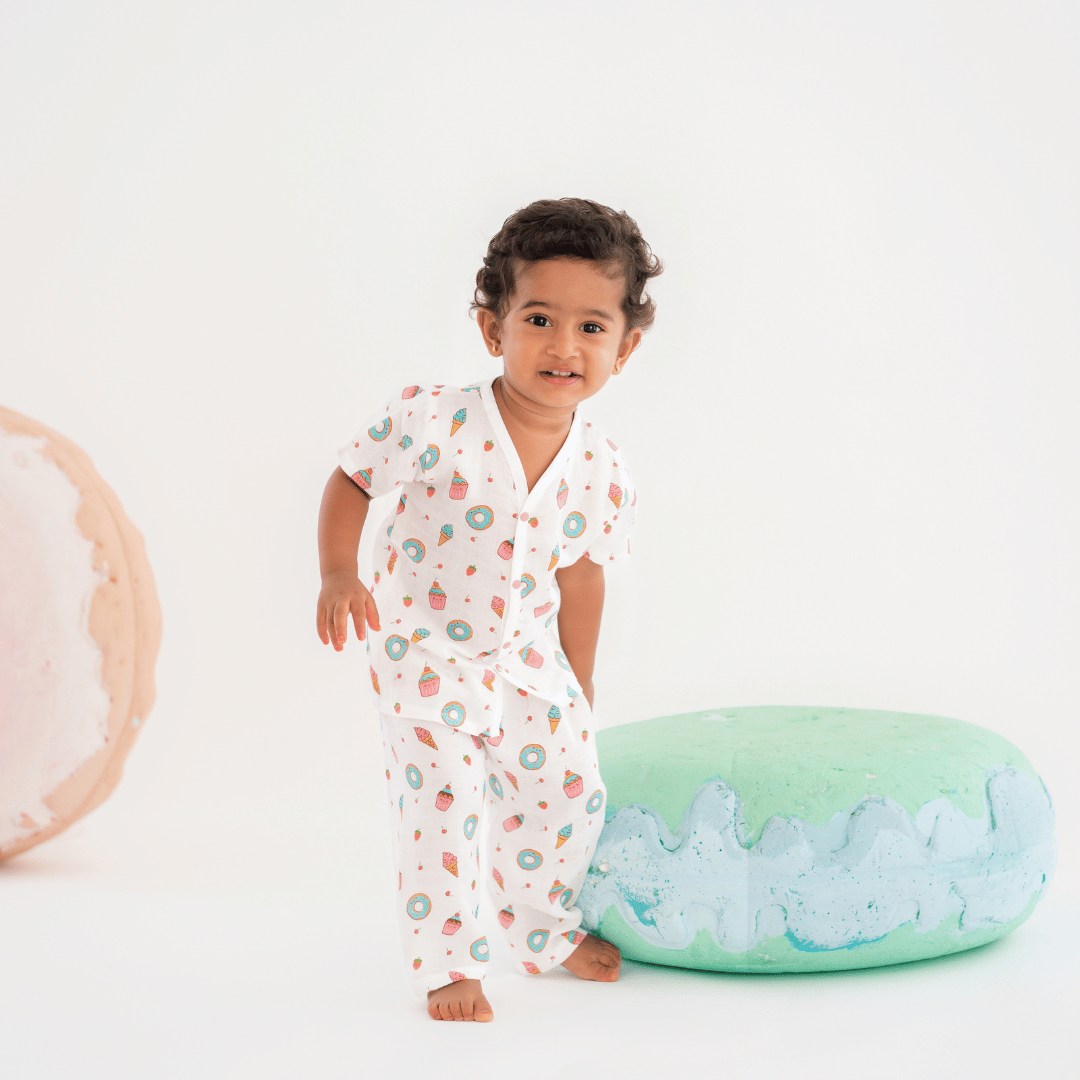Embroidered in the fabric of history, muslin's delicate weave tells a tale of timeless comfort and exquisite craftsmanship. In the world of baby clothing, muslin stands as a testament to an enduring legacy, offering more than just threads and seams. Join us on a journey to unravel the historical tapestry of muslin fabric, tracing its evolution and significance in adorning the most precious bundles of joy: our babies. From its humble origins to its luxurious embrace on newborn skin, this exploration unveils the rich heritage and enduring charm of muslin baby clothing sets throughout the annals of time. Discover how this fabric, steeped in tradition yet adaptable to modern needs, continues to cocoon infants in the gentlest embrace of comfort and care.
Understanding Muslin Fabric
Muslin, with its ethereal touch and whisper-light texture, encapsulates a heritage woven with finesse and versatility. At its core, muslin is a fabric crafted from finely spun cotton threads, revered for its plain weave that yields a fabric as delicate as it is durable. This unique weaving technique creates an airy, open structure, defining the muslin's characteristically soft and breathable nature. Renowned for its sheer quality, muslin transcends the mundane, offering a fabric that drapes elegantly while retaining resilience—a balance that makes it an ideal choice for baby clothing. Its gentle embrace on sensitive skin, coupled with a history steeped in artisanal craftsmanship, sets muslin apart as not just a textile but an embodiment of comfort, tradition, and timeless elegance.
What is Muslin Fabric?
Muslin fabric, steeped in history, possesses defining characteristics that distinguish it from textiles. Comprising finely spun cotton threads woven in a plain technique, muslin forms a lightweight, breathable fabric with a sheer, delicate appearance. Its hallmark attribute lies in the soft, gentle texture, exceptionally comforting for sensitive skin, while historically originating from regions like India and Bangladesh, garnering acclaim for its luxurious feel and quality. Muslin comes in various types, offering options from fine, sheer varieties to thicker types for diverse purposes. Its loose weave ensures excellent airflow, making it highly breathable, and suitable for warm climates or for regulating temperatures, extending its use beyond clothing to blankets, swaddles, and artistic creations. Surprisingly durable and softening with each wash, muslin fabric's longevity and blend of comfort, breathability, and historical significance make it a cherished choice, especially for baby clothing.
Types of Muslin Fabric
Muslin fabric presents various types, each characterized by distinct weaving techniques, thread counts, and specific applications:
- Fine Muslin: Renowned for its sheer quality and delicate texture, fine muslin boasts an extremely high thread count, resulting in a lightweight, almost translucent fabric. It's ideal for delicate garments, baby wraps, and luxurious drapery owing to its ethereal appearance.
- Swiss Muslin: This type of muslin fabric showcases a higher thread count than standard muslin, rendering it smoother and softer. Swiss muslin finds its place in creating finer clothing pieces and intricate designs due to its enhanced durability and luxurious feel.
- Mulmul: Known for its softness and breathability, mulmul is a type of muslin that originates from India. It typically features a slightly looser weave, providing exceptional comfort and versatility. Mulmul fabric is commonly used in making comfortable clothing, swaddles, and scarves.
- Mull: Mull muslin represents a finer variety characterized by a tighter weave compared to standard muslin. Its durability and ability to retain its shape make it suitable for apparel that requires more structure, such as tailored shirts or lightweight dresses.
- Jamdani: A traditional variety originating from Bangladesh and India, jamdani muslin involves intricate handwoven patterns. It's recognized for its ornate designs and craftsmanship, often used in creating luxurious garments and heirloom pieces.
- Double Gauze Muslin: This muslin variation comprises two layers of fine muslin gauze loosely attached, providing excellent breathability and a soft, plush feel. Double gauze muslin is favored for baby blankets, swaddles, and apparel due to its cozy and airy nature.
- Batiste: While not strictly considered muslin, batiste fabric shares similarities in terms of its lightweight and semi-sheer qualities. It's known for its softness and is often used for baby clothes, lingerie, and lightweight clothing items.
Understanding the diversity within muslin fabric helps in selecting the most suitable type for specific purposes, whether it's crafting delicate clothing, ensuring breathability in baby products, or appreciating the artistry of intricate designs in traditional textiles.
Muslin's Cultural and Historical Roots
Muslin fabric carries a rich cultural legacy steeped in historical significance. Originating from ancient civilizations in the Indian subcontinent, particularly in present-day India and Bangladesh, muslin—historically known as "Daka" or "Dhaka" muslin—was revered for its sheer quality and exquisite craftsmanship during the Mughal era. Its production involved skilled artisans weaving threads so fine that it earned the moniker "woven air" due to its delicate nature. Muslin became synonymous with luxury, adorning royalty worldwide, and remains an integral part of South Asia's textile heritage, reflecting skilled craftsmanship and the artistry of a bygone era.
Versatility and Uses of Muslin Fabric in Baby Clothing:
Muslin fabric's adaptability extends to various applications in crafting muslin baby clothes for newborns, offering a range of benefits:
- Swaddles and Wraps: Muslin's lightweight and breathable nature makes it an ideal choice for swaddling newborns. Its soft, gentle touch provides a comforting cocoon for infants, promoting better sleep and a sense of security.
- Clothing Essentials: From onesies to rompers and pajamas, muslin's versatility shines through in crafting various baby garments. Its softness and breathability ensure comfort for infants throughout the day.
- Blankets and Bedding: Muslin blankets, revered for their gentle touch and versatility, serve as cozy wraps for naptime or as lightweight covers for warmer weather. Muslin's ability to regulate temperature keeps babies snug without overheating.
- Nursing Covers and Burp Cloths: Muslin's lightweight and absorbent qualities make it an excellent choice for nursing covers, providing privacy and airflow during breastfeeding sessions. It also serves well as a burp cloth due to its absorbency.
- Playtime Comfort: The Muslin fabric's durability and softness make it suitable for creating baby playmats or comfort items like security blankets. Its gentle touch ensures a safe and soothing environment for play and relaxation.
- Fashionable Accessories: Muslin's adaptable nature extends beyond basic clothing to accessories like bibs, hats, or booties. These accessories crafted from muslin offer both style and functionality for babies.
- Temperature Regulation: Muslin's breathability ensures babies stay comfortable in various weather conditions. Its ability to keep them cool in warm climates and provide a cozy layer in cooler temperatures makes it a practical choice year-round.
- Easy Maintenance: Muslin's durability and ability to become softer with each wash make it a convenient choice for parents. Its resilience to repeated laundering ensures that baby clothing made from muslin retains its quality and comfort.
Understanding the diverse applications and advantages of muslin baby clothes showcases its exceptional adaptability and comfort, catering to the varied needs of both babies and parents alike.
Muslin Cotton: Exploring the Relationship
Muslin and cotton intertwine to create a fabric rich in comfort and enduring allure. Muslin cotton, a blend of meticulously spun cotton threads into muslin fabric, embodies softness and breathability. This fabric delicately caresses sensitive skin, adapts to diverse climates, and transcends generations. This synergy crafts a textile cherished by both parents and infants alike, emphasizing comfort and durability.
Understanding Muslin Cotton: This union inherits cotton's traits—breathability, softness, durability—merged with muslin's delicacy. The resulting fabric balances gentle touch with resilience, ideal for sensitive baby skin. Its ability to retain softness after washing makes it perfect for infant clothing, ensuring comfort in various climates.
Significance of Muslin Cotton: Beyond trends, muslin cotton epitomizes timeless comfort. Adored for its softness and adaptability to growing infants, it blends luxury and practicality. A conscious choice for parents seeking lasting quality, each muslin cotton piece signifies care, comfort, and enduring value.
Conclusion: Muslin's Enduring Charm in Baby Clothing:
Muslin, a timeless thread in the fabric of baby clothing, intertwines comfort, sustainability, and style effortlessly. At the forefront of this narrative stands A Toddler Thing, epitomizing sustainable craftsmanship with its thoughtfully designed, eco-conscious baby products. From ethically sourced organic muslin swaddles to eco-friendly dresses and rompers, each item embodies the gentle touch and durability of muslin while aligning with environmentally conscious parenting. As muslin continues to evolve in baby fashion, A Toddler Thing paves the way, redefining the essence of sustainable comfort for infants. Their range encapsulates muslin's enduring charm, blending tradition, sustainability, and modernity seamlessly for today's conscientious parents and their little ones..



